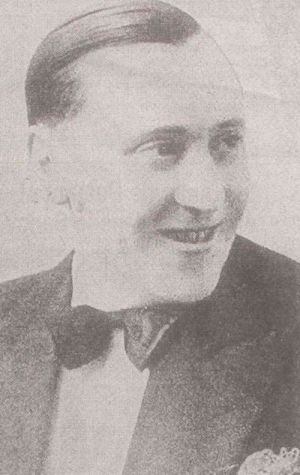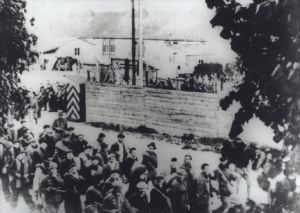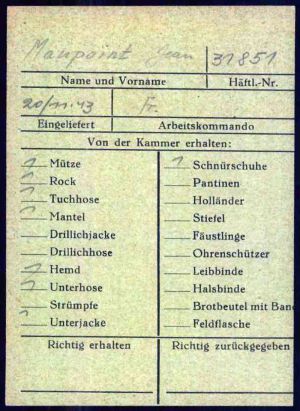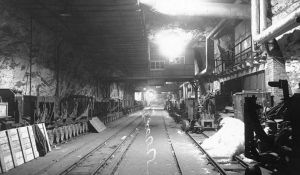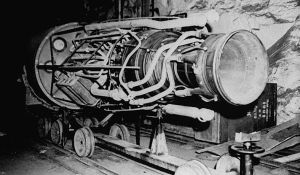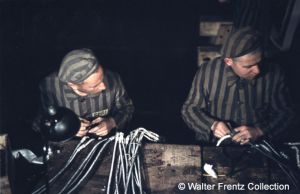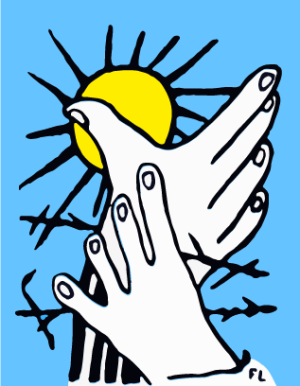
Jean Maupoint
A song to last a lifetime
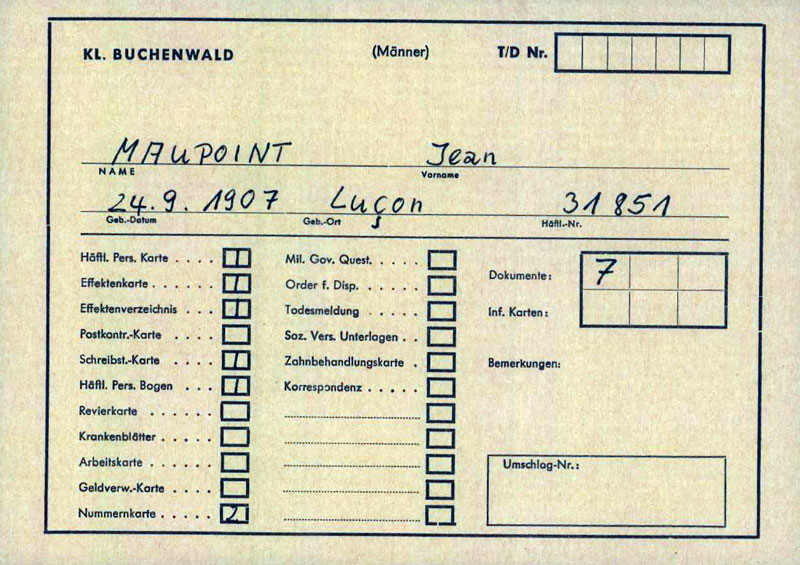
Jean Maupoint was born on 24 September 1907 in Luçon, France. He moved to Clermont Ferrand in February 1932. There he worked as a lynotipiste and a music hall artist. In 1937 he created the satirical song about the “Tiretaine” a river that crosses Clermont Ferrand. The song is funny but, has a dark side to it when listening to it carefully:
Moi quand d’la vie je voudrai en finir,
Pour être sûr de mourir…
Dans le lit d’la Tiretaine
Je me laiss’rai glisser,
J’aurai l’âme sereine
Sachant que la mort sera vite arrivée…
Dans les eaux de la Seine
On est long à s’noyer ;
Tandis qu’dans la Tiretaine…
On est vite asphyxié!
This song will propel him into the world of French Music Hall Artists.
War is coming but he does not hesitate to continue in the same tone to ridicule the occupier by skilfully playing on words. When he walks on the stage with a portrait of Hitler in his hand he asks, "So what do we do? Shall we hang it or nail it?" A part of the audience was not amused and one evening in 1943, they waited for him backstage and handed him over to the Nazis who promptly arrest him.
He was transferred to Compiègne. The Royallieu de Compiègne barracks were built in 1913 and consisted of 25 buildings over an area of 16 hectares. From 1941 to 1944, the barracks of Compiègne Royallieu were used by the German army. The Royallieu camp played a central role in German occupation policy. Most of the inmates were political prisoners, resistance fighters and communists coming from all the prisons in France and bound for the Nazi camps. There were also civilian inmates (Russians, Americans, among others) and Jews.
There he was put on a convoy that left Compiègne on 16 April 1943 for Mauthausen in Germany, where he received prisoner number 26907. He was transferred to the Wiener-Neustadt kommando, and was also detained in Buchenwald. But for Jean Maupoint, even in the dark of the night, held his humor. So he creates satirical songs. His fellow inmates still remember the song: "A compiegne" This song can be listened to in the sidebar to your right.
After some time, around 23 November 1943, Jean was sent to the Dora Mittelbau concentration camp in Nordhausen, which was a subcamp of Buchenwald. On the way to hell Jean Maupoint hums his songs over and over again. The journey lasts two days. In Dora he received prisoner number 31851. While at work assembling V2 rockets he was chosen for a fotoshoot by Walter Frentz, Hitler's official photographer. That famous color picture can be seen on your right aswell.
Pushing cart wagons in the dirt and dark of the Dora Mittlebau tunnels, Jean Maupoint hums his latest creation:
La Marche des convicts, Waltz of the Dora inmates.
Il est parfois des noms
Dont l’origine nous inquiète
Et que nous répétons
Souvent sans rîmes ni raisons.
Parmi ces noms troublants
Qui circulent dans notre tête
Il en est un sûrement
Dont nous nous souviendrons longtemps.
Chorus
Dora, Dora,
Est-ce un chien ou un chat,
Est-ce un nom de fleur ou un nom de femme,
Dora, Dora,
Que ça soit ce que ça voudra
Quel plaisir on aura
Quand on quittera Dora.
Si vous êtes parrain
Après la guerre d’une fillette,
Il faudra c’est certain
Lui trouver un nom assez bien :
Choisissez Dorothée,
C’est un nom de grande coquette,
Et comme ça dans l’intimité
Vous pourrez l’appeler
Chorus
Lorsque vous vous rendrez
Chez un ami faire bombance,
Fatalement vous prendrez
Sur le trottoir un gros pavé,
Votre femme vous dira :
Voyons, Henri, c’est de la démence,
Chérie tu ne comprends pas
Mais à cet ami ça rappellera
Chorus
Un jour en société
Il se peut que vous disiez même :
Tous à poil à côté
Maintenant je vais vous désinfecter.
Rajustant son lorgnon,
Une marquise très Louis XVe
Vous dira : mon garçon
“Vous tenez ça de quel salon?”
Chorus
Quand vous apercevrez
Devant un grand baquet
De pommes de terre
Un cochon s’engraisser,
De suite vous protesterez.
Pour avoir un tel droit
Qu’est-ce que ce cochon
A bien pu faire
Car je connais un endroit
Où il y en aurait au moins pour trois.
Chorus
Si un soir au logis
Votre femme vous disait :
Pour te plaire je t’ai acheté aujourd’hui
Un beau pyjama bleu et gris.
Fous-moi le camp avec ça,
Crierez-vous plein de colère,
Car vois-tu ce pyjama.
Ressemble au costume que je portais à
Chorus
Bientôt quand, sonnera
L’heure de la délivrance
Et qu’enfin Von verra finir
Notre vie de forçat,
En attendant le train
Qui nous ramènera en France,
Tous le cœur plein d’entrain
Nous chanterons ce petit refrain.
Dora Mittlebau and therefor also Jean were liberated on 11 April 1945 by the troops of the US 9th and 104th Infrantry Divisions and the US 3rd Armored Division. Jean was repatriated by plane. He received the FFI badge and writes the “Lettre de Toto au Père Noël”. A song of tears intended for his son Jacky. He sadly passed away at the Hôtel-Dieu de Clermont-Ferrand on August 21, 1945 at the age of 38. This was due to the fact that his health that had taken a turn for the worst in the damp and dark tunnels at Dora Mittlebau.
In August 1945 Jean received the French Resistance Medal and on 6 May 1962, The Rue Jean Maupoint was inaugurated in Clermont Ferrand
A big thank you to Miss Tödtli for checking the data
Personal images
Click the images to enlarge
Share on social media
The stories on my website educate about WWII. Please help by sharing them with your family, friends and on social media. Thank you!
